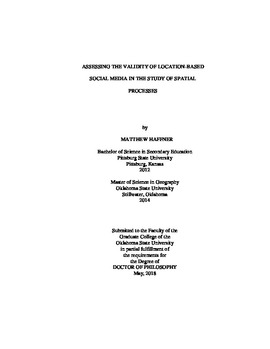| dc.description.abstract | The advent of big spatial data has created new opportunities for studying geographic phenomena. Open mapping projects, citizen science initiatives, and location-based social media all fall under the umbrella of volunteered geographic information and are now frequently used spatial data sources. The fact that these sources are user-contributed as opposed to gathered by experts has raised significant concerns over data quality. While data accuracy, particularly in open mapping projects (e.g., OpenStreetMap), has been given considerable attention, far less has been paid to data validity, specifically on location-based social media. In this three article dissertation, I explore the validity of location-based social media in the study of spatial processes. In the first article, I implement a survey on the Oklahoma State campus to explore college students' behaviors and perceptions of location-based social media and note differences in terms of gender, race, and academic standing. The second and third articles are empirical studies utilizing geolocated data from Twitter, a popular social media platform. The second article makes use of precise location data (e.g., latitude - longitude) and uses geographically weighted regression to explore the patterns of non-English Twitter usage in Houston, Texas. The third article uses general location data (e.g., city) to explore the patterns of #BlackLivesMatter and counter-protest content across the states of Louisiana and Texas. The results of these studies collectively provide an optimistic, though cautionary, outlook on the use of location-based social media data in geography. | |
